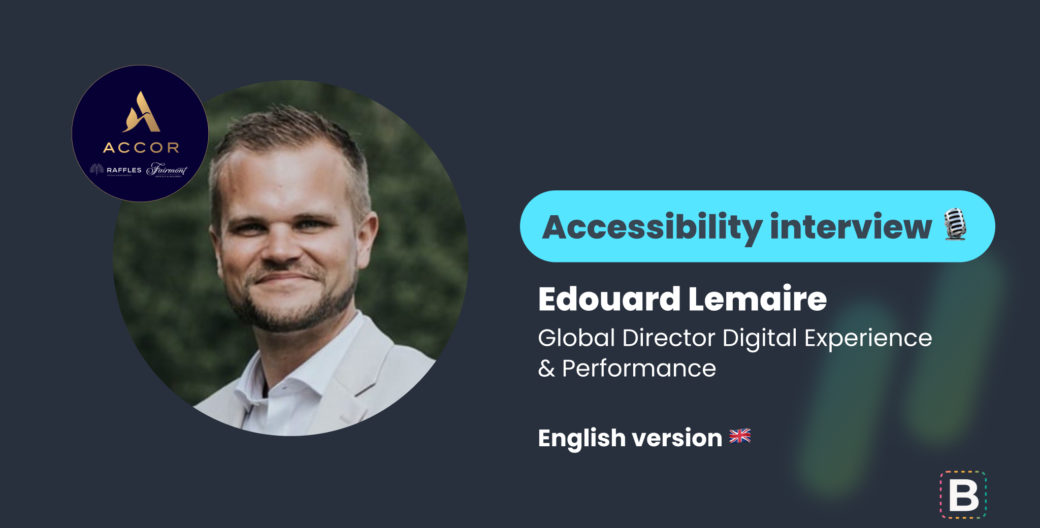Raffles & Fairmont Hotels and Resorts (Accor Group): digital accessibility in luxury hotels, a commitment at the heart of the customer experience
4 minutes de lecture passionnante !
Publié le 3 mars 2025 par Mélanie Coltel

Discover Edouard Lemaire‘s commitment to digital accessibility at Raffles & Fairmont Hotels and Resorts, Accor Group. In this interview led by Nicolas Blum Ferracci, he shares his vision, motivations, and concrete initiatives to ensure accessible luxury hospitality, while emphasizing innovation and performance.
Can you introduce yourself and explain your role at Raffles & Fairmont Hotels and Resorts?
My name is Edouard Lemaire, and I am the Global Director of Digital Experience & Performance for Raffles & Fairmont Hotels and Resorts, two luxury brands within Accor Group, the 4th largest hotel group in the world.
My role focuses on developing and implementing our business strategies across various areas: product, content, analytics, innovation, and performance. The goal is to enhance the user experience, drive revenue growth, and ensure our digital platforms are high-performing and accessible to all.
What does digital accessibility mean to you?
For me, digital accessibility means that all our customers, regardless of their physical or cognitive abilities, should be able to access all information easily and smoothly. In the luxury industry, where excellence and attention to detail are paramount, it is essential to ensure an inclusive experience at every stage of the customer journey, from booking online to their stay at our hotels.
Does accessibility influence your strategic decisions?
Absolutely. Accessibility is now a key criterion in all our strategic decisions. Every project we launch—whether it’s a website redesign or a new feature—is aligned with the international WCAG guidelines. We must meet not only regulatory requirements but also user needs to ensure that every digital product is accessible to all.
What motivated you to focus on digital accessibility?
My growing responsibilities within Accor and the demanding nature of the luxury sector have highlighted the importance of accessibility. In our industry, every detail matters. To deliver a truly luxurious experience, we must ensure that every customer, including those with specific needs, can enjoy our services. Accessibility is a key driver of customer satisfaction and inclusivity.
Can you share a defining experience that shaped your commitment to accessibility?
There have been several impactful moments. For example, some projects were put on hold because they didn’t meet accessibility standards. This showed me the importance of integrating accessibility from the very beginning of a project. More recently, we launched a room-filtering feature that allows customers to find accessible rooms more easily. The positive feedback from users confirmed the real impact of such initiatives.
What initiatives have you implemented to promote accessibility at Fairmont and Raffles?
We’ve implemented several key actions! Not only have we aligned our direct channels with the WCAG recommendations, but we have also created an accessibility charter within the Accor group to raise awareness and guide our teams.
We have also developed a function for filtering accessible rooms on our sites. This includes criteria such as wheelchair access, adapted showers or specific equipment. Feedback has been very positive, both from users and hotels.
What challenges have you encountered, and how did you overcome them?
One significant challenge was launching new websites while ensuring they adhered to accessibility requirements. This had an impact on our timelines and required us to adjust our development processes. We had to rethink the user experience and design to ensure equal access to information for all users.
Today, accessibility is fully integrated into our workflows and is no longer a challenge but a standard practice.
How do you train your teams on accessibility rules and best practices?
Training is crucial. I ensure my teams are regularly upskilled through training sessions and e-learnings on accessibility, but also conferences and seminars to stay informed on digital trends and accessibility, as well as monthly meetings where we share best practices and discuss innovative solutions.
We also encourage proactive learning through relevant articles and podcasts, helping the team anticipate trends and remain at the forefront of accessibility.
How do you see the future of digital accessibility at Accor?
I believe digital accessibility will continue to evolve positively. Over time, it will become mandatory for all companies, with penalties for those failing to comply, similar to what is currently happening in some countries. Accessibility should not be seen as a burden but as an opportunity to create inclusive products that reach a broader audience.
At Accor, accessibility will remain central to our strategy, helping us stand out and enrich the overall customer experience.
What resources would you recommend for someone new to digital accessibility?
I recommend focusing on the WCAG standards, which are the benchmark for improving digital accessibility. It’s also valuable to follow international accessibility articles and studies. Attending conferences and listening to specialized podcasts are excellent ways to stay updated on the latest trends and innovations.
What advice would you give to someone hesitant to integrate accessibility into their project?
I would emphasize that accessibility is not a constraint but an opportunity. It allows you to reach a wider audience and improve the user experience for everyone. While it might seem challenging initially, the long-term benefits—including customer satisfaction and business growth—are undeniable. Accessibility is about being inclusive and preparing for the future.
Do you have a final message to share on digital accessibility?
Digital accessibility is everyone’s business. It’s an investment in the future of our businesses and our society.
With demographic and technological changes, it’s our responsibility to offer everyone easy access to our services. Ensuring their satisfaction is also a guarantee of our own success.

